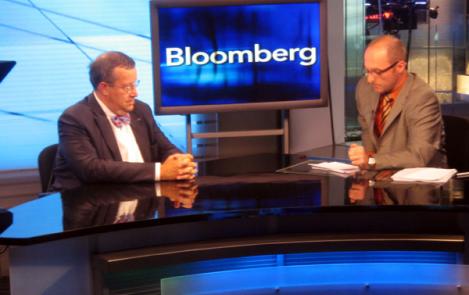-
Reset
+

"Estonian President Says Slower Growth Is Welcome", Bloomberg, 26 September 2007
26.09.2007
Estonian President Toomas Ilves said a slowdown in the Baltic country's economic growth is welcome after last year's pace was "too much".
Estonia anticipates growth "in the neighborhood of'' 7 percent to 7.7 percent this year, compared with 11.4 percent in 2006, Ilves said in an interview in New York yesterday.
"Eleven percent economic growth is too much," Ilves said. "We have been going through a phase of tremendous demand for foreign goods which means that we have a rather high current- account deficit. We are seeing a correction right now, where people are beginning to look more carefully at their spending."
Estonian economic growth, the second fastest in the European Union last year, slowed in the second quarter to 7.6 percent, the lowest level in 2 1/2 years, as domestic demand weakened due to rising interest costs and stricter lending requirements imposed by banks.
"The super-fast economic growth has by now been replaced by a somewhat more moderate growth rate, which is still among the fastest in the European Union," Prime Minister Andrus Ansip said in parliament today, according to government's Web page.
The economy is on a "stable footing," he said, as government sector debt is the EU's smallest and keeps shrinking, exports keep growing, the current-account deficit has started to shrink and employment is rising.
Current Account
The current-account deficit, the broadest measure of trade in goods and services, narrowed in the second quarter to 14 percent of gross domestic product from a 14-year high of 21.9 percent of GDP in the first quarter.
The 53-year-old Ilves, who was born in Stockholm and is known for his trademark bow-ties, last year became Estonia's third elected president since the end of Soviet occupation in 1991, and the EU's youngest elected head of state. He ran the Estonian desk for Radio Free Europe before the end of the Soviet Union and served twice as foreign minister.
He said inflation, at 5.7 percent in August and exceeding euro-entry criteria, will accelerate next year due to planned excise tax increases on fuel, alcohol and tobacco, in line with EU requirements.
"We knew all along this would bring a certain inflationary shock," Ilves said. He said inflation is expected to decline in the following years and reiterated the government's unofficial target of adopting the euro in 2011.
Ratings Outlook
Standard & Poor's Ratings Services lowered Estonia's outlook to negative from stable in July, citing a higher risk of a "hard landing", or a sharp growth slowdown, because of a growing trade gap and accelerating inflation. Moody's Investors Service this month lowered its outlook for Estonia to stable from positive, citing similar reasons.
Ilves said it is up to neighboring Russia to improve its relations with Estonia, which have hit a low after the Baltic country in April relocated a World War II monument from the center of Tallinn.
"They call the tune, there is not very much we can do," Ilves said.
The move sparked Estonia's worst riots since it regained independence in 1991 and protests at its embassy in Moscow.
It has also worsened trade relations, as Russian oil shipments through Estonia slumped to an 11-year low in August.
Article by Klaus Wille and Ott Ummelas, Bloomberg

